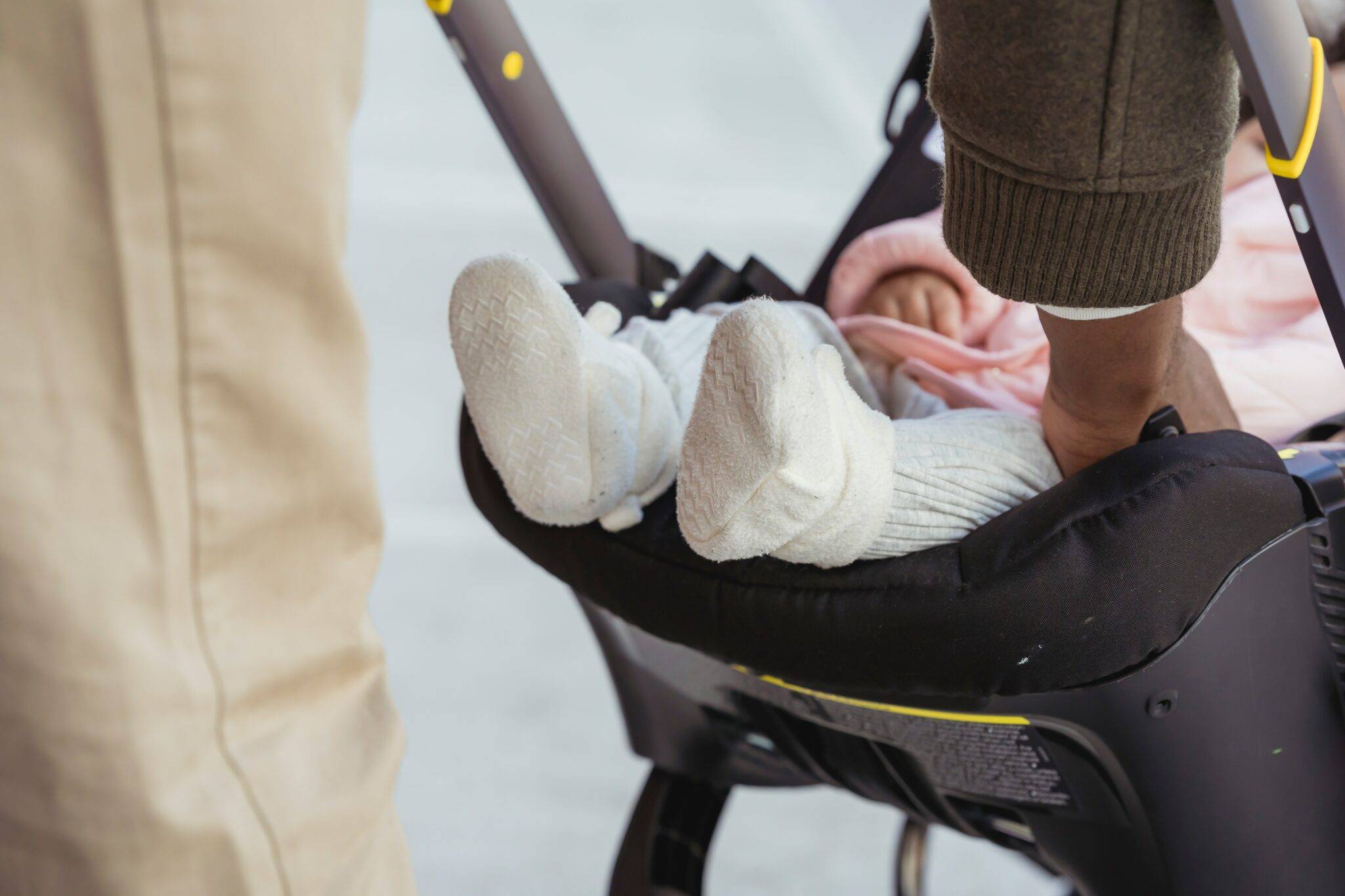It’s not surprising for newborns to struggle with gas. As a new parent, it’s so distressing that your newborn baby is gassy, seeing them cry, squirm, and be uncomfortable due to gas buildup. Gas in newborns happens for many reasons, and while it’s harmless, it leads to long crying spells, sleep disturbances, and general discomfort.
Fortunately, there are several gentle, effective ways to relieve your baby’s gas and help them feel better quickly. This article will explore simple and natural remedies you can try at home to soothe your baby’s gas discomfort. Understanding the causes of gas and implementing the remedies ensures your baby is more comfortable and happier.
Newborn Baby is Gassy: What Causes Gas
Gas in newborns is common. Their digestive systems are still developing, making it harder to break down food, especially when they’re first introduced to breast milk or formula. There are several reasons why a baby might experience gas, and being aware of these causes helps you better manage the situation. Some common reasons include:
- Swallowed Air During Feeding: Newborns tend to swallow air when feeding, especially if they’re drinking quickly or not latching properly during breastfeeding. This can be exacerbated if they’re using a bottle with a fast-flowing nipple or if the angle of the bottle allows for more air to mix with the milk or formula. When air is taken in, it becomes trapped in the digestive system, causing gas and discomfort.
- Crying for Extended Periods: Babies can also swallow air while crying, which adds to the gas buildup. If your baby is colicky or fussy for long stretches, this can lead to more air being trapped in their stomach, further increasing the chance of gas.
- Immature Digestive System: Newborns’ gastrointestinal systems are still developing. Their bodies are learning to digest milk or formula efficiently. As their digestive systems mature, they may pass gas more frequently, leading to discomfort.
- Food Sensitivities: Certain foods can be difficult for newborns to digest. This is particularly common among breastfed babies, as some foods in a mother’s diet can pass through her milk and cause gas in the baby. Common culprits include dairy products, caffeine, and vegetables like broccoli or cabbage.
- Introduction to Formula or Switching Formulas: For formula-fed babies, switching formulas or introducing formula can cause an upset stomach and gas. This is because babies may need time to adjust to the new proteins and ingredients in the formula.
Newborn Baby is Gassy: Remedies to Relieve
1. Burp Your Baby Frequently
One of the easiest and most effective ways to prevent and relieve gas is to burp your baby regularly. Burping helps expel any air that your baby swallows while feeding. If the air isn’t released, it can travel through your baby’s digestive system and lead to discomfort.
How to Properly Burp
To burp your baby effectively, you can try different positions to see what works best for your little one:
- Over-the-shoulder burping: Hold your baby upright with their head resting on your shoulder. Gently rub or pat their back until they burp.
- Sitting upright: Sit your baby on your lap, supporting their chest and head with one hand while gently patting their back.
- Lying face down on your lap: Place your baby on their tummy across your knees and gently pat their back.
Burp your baby in the mid-feeding session and after feeding. If bottle-feeding, burp them every 2-3 ounces, and breastfeeding, burp them when switching breasts. Burping your baby releases trapped air and makes feeding more comfortable, reducing gas buildup.
2. Use the Bicycle Legs Exercise
A great way to help your baby release gas is by moving their legs in a bicycle-like motion. This technique is simple, gentle, and effective in relieving trapped gas. The gentle motion of their legs stimulates the intestines, helping the trapped gas to move through the digestive system and be expelled naturally. This technique is also a fun and interactive way to engage with your baby, making it a positive experience.
How to Perform
- Lay your baby on their back on a soft surface, such as a blanket on the floor.
- Hold their legs up and move them in a circular, pedaling motion, similar to riding a bicycle.
- Continue this movement for about 2-3 minutes. Repeat the exercise several times throughout the day if your baby is uncomfortable.
3. Give a Gentle Tummy Massage
A soothing tummy massage can help break up gas bubbles in your baby’s digestive tract and provide quick relief from discomfort. Massaging the belly in a specific direction can stimulate digestion and let the gas move through the intestines. This gentle motion helps to move the gas along, and many parents find that a few minutes of tummy massage is enough for the baby to pass gas. This can also be a bonding experience that soothes your baby.
 Steps To-Do
Steps To-Do
- Place your baby on their back in a comfortable position.
- With a gentle, circular motion, run your fingers starting at the bottom of the ribcage and moving down to the lower belly.
- Always move your hands clockwise, following the natural path of digestion.
- Continue massaging for a few minutes, monitoring your baby’s cues to ensure they’re comfortable.
4. Try Gripe Water or Gas Drops
For many parents, over-the-counter remedies such as gripe water or gas drops can help relieve their baby’s gas discomfort. Gripe water is an herbal supplement that contains ginger, fennel, and chamomile, known for their digestive-soothing properties. Gas drops contain simethicone, an ingredient that helps break up gas bubbles, making it easier for your baby to pass gas.
How to Use
- Gripe water: Administer the dosage with a dropper or mix it into your baby’s bottle. This is often used for babies experiencing discomfort due to gas or colic.
- Gas drops: Follow the instructions provided by your pediatrician or the product label. Gas drops can be mixed with formula or breast milk or given directly to your baby with a dropper.
Always consult your pediatrician before trying over-the-counter remedies. While gripe water and gas drops are generally considered safe, ensure they won’t interfere with any other treatments or conditions your baby may have.
5. Adjust Feeding Positions
How you feed your baby affects how much air they swallow. The position in which your baby feeds can help prevent gas by minimizing air taken in.
Breastfeeding Positions
- Upright positioning: Hold your baby in an upright position during feedings. This can reduce the amount of air swallowed, as the milk flows more easily into the stomach without trapping air.
- Football hold: In this position, the baby is tucked under your arm with their body along your side and their head at your breast. This can help them latch more effectively and swallow less air.
Bottle-Feeding Tips
- Elevate the bottle: Make sure the bottle’s nipple is filled with milk or formula to prevent your baby from gulping down air. Hold your baby at a 45-degree angle to promote proper feeding and digestion.
- Use slow-flow nipples: If your baby is using a bottle, choose a slow-flow nipple to help regulate the milk flow and prevent them from swallowing too much air.
Positioning your baby correctly during feeding and keeping them upright for at least 20-30 minutes after a meal significantly reduces the chances of gas buildup.
6. Switch Bottles or Nipples
If you’re bottle-feeding and your baby continues to have gas issues, it might be worth considering switching the bottle or nipple. Some bottles are specifically designed to minimize the amount of air that babies swallow during feedings. Sometimes, something as simple as switching to a different type of bottle or nipple can make a significant difference in how much air your baby ingests.
Choosing the Right Bottle
- Anti-colic bottles: These bottles feature venting systems. The system lets air escape from the bottle, thus, preventing it from being ingested by your baby.
- Slow-flow nipples: These types of nipples can help control the milk flow, reducing the air your baby swallows.
7. Monitor Your Diet (if Breastfeeding)
For breastfeeding mothers, certain foods in your diet may contribute to your baby’s gas. If you suspect that something you’re eating is causing gas in your baby, keep track of what you eat and how your baby responds after feeding. If you notice that your baby’s gas seems to be linked to your diet, consider eliminating certain foods one at a time to see if their symptoms improve. Always consult with your pediatrician before making significant changes to your diet.
Foods That Cause Gas in Breastfed Babies
- Dairy products: Milk, cheese, yogurt, and other dairy products are common triggers in breastfed babies. Some babies are sensitive to the proteins in cow’s milk.
- Cruciferous vegetables: Broccoli, cauliflower, and cabbage are known to cause gas in adults and babies.
- Spicy foods and caffeine: Spicy foods and caffeine can also affect your baby’s digestion through breast milk.
When to Consult a Pediatrician
While gas is normal for newborns, persistent or severe gas discomfort could signify a more serious condition, such as a food intolerance or colic. If your gassy newborn has accompanying symptoms such as excessive crying, vomiting, diarrhea, or difficulty feeding, reach out to your pediatrician.
Your doctor will determine the underlying issue contributing to your baby’s gas and provide treatment options. For further insights on newborn care, visit Omega Pediatrics, where you can find expert advice on parenting topics, including feeding challenges and digestive concerns.
Help Relieve Your Gassy Newborn to Make Them Comfortable
Dealing with a gassy newborn can be challenging for you and your baby, but with the right approach, relief is within reach. Whether trying bicycle legs, burping more often, or adjusting feeding positions, these remedies alleviate your baby’s gas pain quickly and effectively.
Be patient and consistent. Consult your pediatrician for your concerns. For expert advice on newborn care, check out Omega Pediatrics’ blog, where you’ll find helpful tips on everything from gas relief to general baby care. These articles are worth reading:
- 8 Common Problems in Newborns: Here’s What You Should Know
- 10 Effective Newborn Bonding Activities: Strengthening the Connection
Addressing the root causes of gas and implementing these simple remedies will ensure your baby is comfortable and enjoys peaceful, happy moments together!


 Steps To-Do
Steps To-Do


